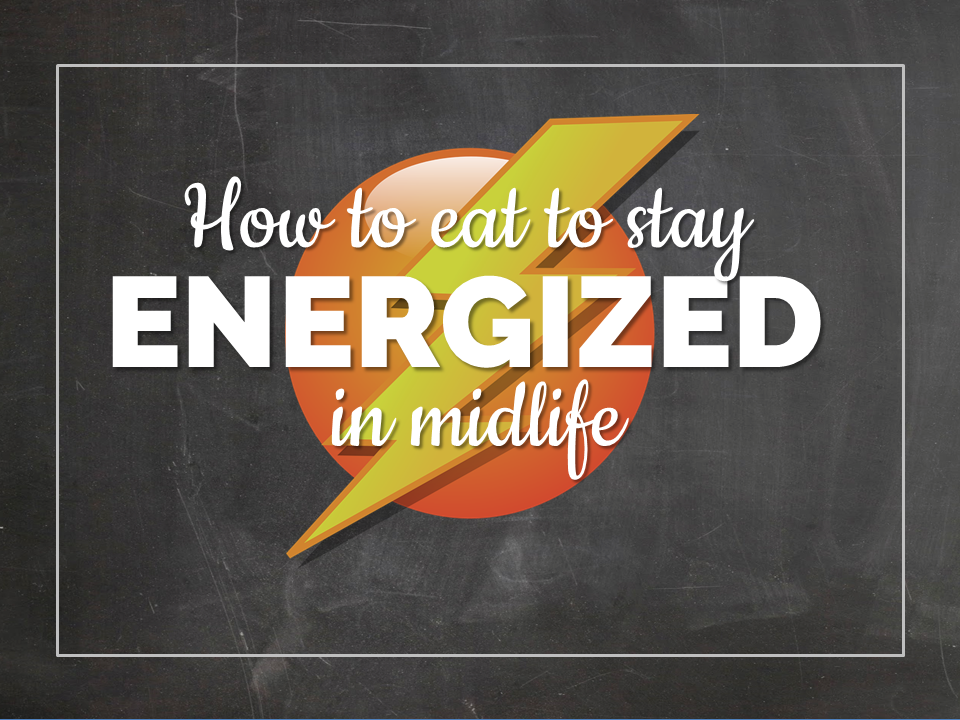Are you feeling less than energetic these days?
Maybe you notice you’re more tired, or lethargic, or even exhausted?
It’s not just because you’re getting older, I promise.
Aside from all the things you’re juggling, what you’re eating may be the culprit.
When you’re in perimenopause and menopause, your hormones are changing, and like it or not, that takes up a good amount of your energy.
So, if you want to increase your energy up and make this hormone shift smoother, consider the foods your’re choosing
Choose foods that give you energy rather than zap your energy.
To help you out, here are some energizing food tips that are known to keep you energized in midlife:
1. Fuel Up with Fiber
Fiber is a nutritional powerhouse that offers tonnes of benefits.
It helps you digest, keeps your bowels moving regularly, and, in turn, helps prevent constipation, a common issue in perimenopause.
And, fun fact, fiber-rich foods help you manage your weight and support your heart health.
So, how do you get more fiber?
Indulge in fruits and vegetables: Load up on a colorful variety of fruits and veggies, as they’re excellent sources of fiber. Berries, apples, citrus fruits, leafy greens, and cruciferous vegetables like broccoli are not only fiber-rich but also offer numerous other health benefits.
And if you’re going to eat grains, go for whole. Choose brown rice, quinoa, and oatmeal more often than processed, wheat-based options (e.g. bread and pasta). You’ll get more fiber, vitamins and minerals, and a boost of energy that will sustain you through the day.
Get a leg up with legumes: Legumes are a great source of both soluble and insoluble fiber. Consider consuming more lentils, chickpeas, black beans, kidney beans, and lima beans. And btw, nuts and seeds are also great sources of fiber.
2. Emphasize Good Fats
Here’s my plea: Stop the low-fat, no-fat fad, it’s very eighties.
We know so much more about the importance of fats, and in particular we now know that fats aren’t making us fat.
Especially the good fats.
In fact, good fats are essential for hormone production, absorbing certain vitamins, and keeping bad cholesterol (LDL) down and good cholesterol (HDL) up.
In short, fats are needed for optimal health and energy.
So, here are some sources of good fats which you can consider:
Avocados: This creamy and delicious fruit is packed with heart-healthy monounsaturated fats, fiber, and essential nutrients. Add sliced avocado to salads, spread it on sprouted-grain toast, or incorporate it into smoothies for an energy-boosting treat.
Nuts and seeds: Almonds, walnuts, chia seeds, flaxseeds, and hemp seeds are all excellent sources of healthy fats, fiber, and protein. Snack on a small handful of nuts or sprinkle seeds over yogurt, salads, or oatmeal for an added energy punch.
Olive oil: Swap out unhealthy oils and opt for extra virgin olive oil as your primary cooking oil. It contains monounsaturated fats and antioxidants, offering a flavorful and heart-healthy addition to your meals. Avocado oil and safflower oil can also be good for cooking. And if not for cooking, you can also use walnut oil…. so good.
3. Power Up with Protein
Protein supports muscle maintenance, repair, and hormone production. And it also provides sustained energy, helps in weight management, and plays a role in keeping your bones strong.
As you may know, I’m very pro plant-protein, so if you can eat meat more sparingly and turn to other sources of protein, you’ll also reap the benefits of better digestion and a healthier planet.
So, here are some sources of protein to include in your diet:
Plant-based proteins: Legumes (such as lentils, chickpeas, and beans), tofu, tempeh, and quinoa are solid sources of plant-based protein. They also offer fiber, vitamins, and minerals, making them a wholesome choice for midlife women.
Fish: Fatty fish like salmon, mackerel, and trout are not only rich in protein but also provide omega-3 fatty acids, which are beneficial for heart health and brain function. Include fish in your diet a few times a week to reap these benefits.
Lean meats, poultry, and eggs: If you’re going to choose meat, select lean cuts of chicken, pork, and beef and preferably from a humanely raised source. Eggs are also a great source of protein, simple to make, and contrary to previous concerns, eggs rarely increase cholesterol and in fact, have to shown to benefit heart health.
4. Extra energy boosting tips
As you age, there are certain nutrients that you tend to lose, and which may impact your energy.
So, here are a few tips to keep you moving full steam ahead:
Iron-rich foods: Iron deficiency is more common for women in midlife, but it’s crucial for oxygen transport and energy production. So, be mindful to include iron-rich foods like fish, leafy greens, legumes, lean meats, and even fortified cereals to keep you energized.
Vitamin B12: As you age, absorbing vitamin B12 from food becomes more challenging. And if you’re vegan, it’s essential to supplement with B12 because it only naturally comes from animal products. You can also get it from foods fortified with vitamin B12, such as fortified cereals, dairy products, and nutritional yeast.
Hydrate: Staying hydrated is essential for energy levels. Drink plenty of water throughout the day and include hydrating foods like fruits and vegetables with high water content.
What are you taking away?
I’d love to know if there’s anything that surprised you or that you want to try based on what I’ve shared here.
Please, post in the comments, I’d love to know.
What brought this up for me was a recent diagnosis of anemia, meaning my red blood cell count is lower than normal.
And although I feel fine, I recognize that this can make me feel more tired and it’s important to keep my energy up.
So, what and how I eat has an even more important meaning to me now.
And I’m also well aware that the more energy I have, the more energy my body has to fight off illness and disease.
I recognize that what we eat, and why we eat, makes all the difference to our energy and our health.
So, if you understand why eating well is so important for you, it will make any change a whole lot easier.
Keep moving forward,
Debbie
P.S. If you want to feel less drained and more energized, I can help. Whether it’s a change of eating habits, becoming more active, sleeping better, or managing stress – or all of the above – I’m here to get you on track and feeling your best. Curious? Email me or just book a free coffee chat.


